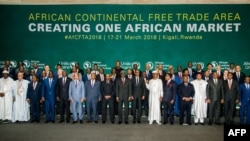The Addis Ababa destined AU summit will witness 54 African leaders, with Eritrea being the only hold out, meeting for two days of talks that are set to begin Saturday under the theme “Acceleration of AfCFTA implementation.”
Since its launching three years ago, leaders on the continent have failed to fully capitalize on the mandate of the continental pact.
The AfCFTA's mandate is to boost intra-Africa trade by 60 percent by 2034 by eliminating all tariffs, creating an economic bloc of 1.3 billion people with a combined domestic product of $3.4 trillion.
Experts applaud leaders on the continent for the pact that could lift 50 million Africans out of extreme poverty, however, note that implementation has fallen short of the goal due to several hurdles, among them disagreements over tariff reductions and border closures triggered by the COVID-19 pandemic.
In an interview with news outlet Agence France-Presse, Paul-Simon Handy, the regional director of the Institute for Security Studies in Addis Ababa, said it will take some time before the trade agreement comes to fruition.
“There is a declared political will, but it will take a long time to put in place,” said Handy.
Dorine Nininahazwe, the African Union director of U.S.-headquartered non-profit One Campaign, echoed Handy’s sentiments.
“There are fears from certain African countries that with opening borders, they will have an influx of people they cannot control,” she said.
Elizabeth Ajok, a South Sudanese entrepreneur said she has witnessed several women facing problems at border crossings while attempting to conduct business under the AfCFTA.
“They are facing a lot of challenges like violence at the border, they are being intimidated, and sometimes some of their items are being confiscated or their goods are taken because of clearence,” said Ajok.
“They will also overcharge you because you are a woman. You will be taxed. Sometimes they just look at us. They see that you are just a woman, so you don’t deserve to do business,” she added.
Ajok’s sentiments were echoed by Zaithwa Milzanzi, a Malawian female entrepreneur.
“You find yourself with required fees, the papers are in order, everything is in order and yet you find some officers at the border asking you for sexual things and you are think, ‘Why?’” said Milzanzi.
“It really hinders your progress and your ability to trade as a young woman. So, this needs to be addressed if young women are to be considered and fully protected under this regime,” she added.
VOA’s Mohammed Yusuf contributed to this report. Some information was sourced from Agence France-Presse.
